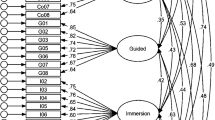Abstract
In this paper, we detail a software platform that enables game developers to expose aspects of their games to researchers who are not necessarily familiar with game development, providing them the possibility to customize game content for behavioral user research, and more specifically to embed survey items in a game context. With this platform we introduce the concept of Games User Research as a Service (GURaaS). This articled describes the process we followed to design GURaaS, its high level architecture and its application in a case study. We envision that GURaaS will assist researchers and organizations by helping them expand their reach in finding participants and in collecting survey data reducing the tedium for survey participants.
Access this chapter
Tax calculation will be finalised at checkout
Purchases are for personal use only
Similar content being viewed by others
Notes
- 1.
- 2.
Free online game http://kaocean.com/runner/.
- 3.
References
Luengo-Oroz, M.A., Arranz, A., Frean, J.: Crowdsourcing malaria parasite quantification: an online game for analyzing images of infected thick blood smears. J. Med. Internet Res. 14, e167 (2012)
Khatib, F., Cooper, S., Tyka, M.D., Xu, K., Makedon, I., Popovic, Z., Baker, D., Players, F.: From the Cover: Algorithm discovery by protein folding game players (2011)
von Ahn, L., Dabbish, L.: Labeling images with a computer game. In: ACM Conference on Human Factors in Computing Systems, pp. 319–326 (2004)
Mirza-Babaei, P., Zammitto, V., Niesenhaus, J., Sangin, M., Nacke, L.: Games user research. In: CHI 2013 Extended Abstracts on Human Factors in Computing Systems - CHI EA 2013, p. 3219 (2013)
Nacke, L., Moser, C., Drachen, A., Mirza-Babaei, P., Abney, A., Zhenyu, Z.: (Cole) lightweight games user research for indies and non-profit organizations. In: CHI Extended Abstracts on Human Factors in Computing Systems, pp. 3597–3603 (2016)
Yusoff, A., Crowder, R., Gilbert, L., Wills, G.: A conceptual framework for serious games. In: Proceedings - 2009 9th IEEE International Conference on Advanced Learning Technologies, ICALT 2009, pp. 21–23 (2009)
Medler, B.: Player dossiers: Analyzing gameplay data as a reward. Game Stud. 11 (2011)
Learning, D.G.: Fun, Play and Games: What Makes Games Engaging. Scientist, 1–31 (2001)
Hoffman, B., Nadelson, L.: Motivational engagement and video gaming: a mixed methods study (2010)
Sharritt, M.J., Sharritt, M.A.: User-experience game research? In: Games + Learning + Society (GLS) 6.0 (2010)
Charsky, D.: From Edutainment to Serious Games: A Change in the Use of Game Characteristics (2010)
Maslow, A.H.: A Theory of Human Motivation (1970)
Crawford, C.: The art game design. Epilepsy Res. 49, 512 (2008)
Schell, J.: The Art of Game Design: A Book of Lenses. Morgan Kaufmann, Burlington (2008)
Lazzaro, N.: Why We Play Games: Four Keys to More Emotion Without Story (2004)
In-game advertising the right way: Monetize, engage, retain (2016)
Björk, S., Holopainen, J.: Patterns in Game Design (2005)
Berkovsky, S., Coombe, M., Freyne, J., Bhandari, D., Baghaei, N.: Physical activity motivating games: virtual rewards for real activity. In: CHI 2010 Games Play, pp. 243–252 (2010)
Geraldus Galehantomo, P.S.: Platform Comparison Between Games Console, Mobile Games And PC Games (2015). http://journal.unika.ac.id/index.php/sisforma/article/view/407
Mehm, F., Reuter, C., Göbel, S., Steinmetz, R.: Future trends in game authoring tools. In: Herrlich, M., Malaka, R., Masuch, M. (eds.) ICEC 2012. LNCS, vol. 7522, pp. 536–541. Springer, Heidelberg (2012). doi:10.1007/978-3-642-33542-6_70
Nacke, L.E., Drachen, A., Kuikkaniemi, K., De Kort, Y.A.W.: Playability and player experience research. In: Proceedings of the IEEE, pp. 1–11 (2009)
Behrend, T.S., Sharek, D.J., Meade, A.W., Wiebe, E.N.: The viability of crowdsourcing for survey research. Behav. Res. Methods 43, 800–813 (2011)
Dolmaya, J.M.: The Ethics of Crowdsourcing. Linguist. Antverp, pp. 97–110 (2011)
Yannakakis, G.N., Spronck, P., Loiacono, D., André, E.: Player modeling (2013). http://drops.dagstuhl.de/opus/volltexte/2013/4335/
van Lankveld, G., Spronck, P., van den Herik, J., Arntz, A.: Games as personality profiling tools. In: 2011 Conference on Computational Intelligence and Games, pp. 197–202 (2011)
Worth, N.C., Book, A.S.: Personality and behavior in a massively multiplayer online role-playing game. Comput. Human Behav. 38, 322–330 (2014)
Pereira Santos, C., Khan, V.-J., Markopoulos, P.: Inferring a player’s need for cognition from hints. In: ACM Intelligent User Interfaces 2016, pp. 76–79 (2016)
Pereira Santos, C., Hutchinson, K., Khan, V.J., Markopoulos, P.: Measuring self-esteem with games. In: ACM Intelligent User Interfaces 2017, pp. 95–106 (2017)
Namiot, D., Sneps-Sneppe, M.: On Micro-services Architecture (2014). http://injoit.org/index.php/j1/article/view/139
Rosenberg, M.: Rosenberg self-esteem scale (RSE). Accept. Commit. Ther. 52 (1965)
Author information
Authors and Affiliations
Corresponding author
Editor information
Editors and Affiliations
Rights and permissions
Copyright information
© 2017 Springer International Publishing AG
About this paper
Cite this paper
Santos, C.P., van de Haterd, J., Hutchinson, K., Khan, VJ., Markopoulos, P. (2017). GURaaS: An End-User Platform for Embedding Research Instruments into Games. In: Barbosa, S., Markopoulos, P., Paternò, F., Stumpf, S., Valtolina, S. (eds) End-User Development. IS-EUD 2017. Lecture Notes in Computer Science(), vol 10303. Springer, Cham. https://doi.org/10.1007/978-3-319-58735-6_3
Download citation
DOI: https://doi.org/10.1007/978-3-319-58735-6_3
Published:
Publisher Name: Springer, Cham
Print ISBN: 978-3-319-58734-9
Online ISBN: 978-3-319-58735-6
eBook Packages: Computer ScienceComputer Science (R0)




